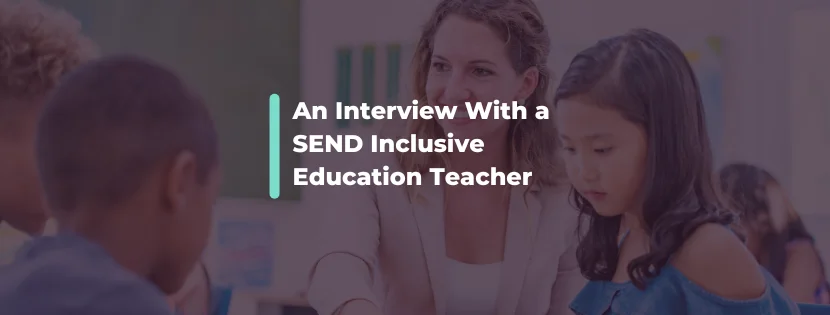"We Need To Design Education Around Children." Interview With a SEND Inclusive Education Teacher
13 Oct, 20251-2 minutes
In this blog, you will learn:
- About the role of a SEND Inclusive Education Teacher from observing children in classrooms to supporting schools.
- Why inclusion should be seen as more than a single strategy and how going beyond traditional ideas of teaching creates meaningful change for every child.
- How this SEND Inclusive Education Teacher works to strengthen inclusive practice to ensure children with SEND receive personalised support.
- Where the latest SEND jobs are and how to apply for them.
Every school faces barriers to learning, and for many Teachers the challenge lies in finding the right strategies and support to meet the diverse needs of their students.
According to the School Report 2025, Teachers identified attendance, SEND and behaviour as the top three expected barriers to students’ learning in the next 6 months. SEND was highlighted as the most significant concern for primary schools, with 78% of Teachers flagging it as a barrier.
We recently spoke to Bex Watton, a SEND Inclusive Education Teacher who is passionate about inclusive practice and neurodiversity-affirming approaches. As part of the SEND Inclusive Education Team, Bex supports mainstream primary and secondary schools and Additionally Resourced Provisions (ARP).
Bex is a champion of inclusion and in this interview, she shares how she helps schools feel confident and capable of delivering high-quality SEND provision. For the last 9 years, Bex has supported various local authorities and has worked as both an Autism Provision Teacher and in the Early Years Foundation Stage.
Throughout this interview, you’ll discover the importance of getting to know students beyond their diagnosis to ensure every child feels they can be themselves and thrive.
Tell us about your career journey so far
I actually fell into the world of SEND by accident. I went to university and studied Ancient History and Egyptology, with dreams of becoming a Museum Curator. While I was there, I volunteered to teach Latin to local primary school students and something just clicked. I discovered I loved teaching!
After graduating, I started gaining experience as a Teaching Assistant. One day, a recruitment agency placed me as a 1:1 for an autistic child and I never really looked back. Fast forward 11 years and I’ve never stopped working with children with additional or specialist needs.
I worked as a 1:1 in both mainstream and specialist settings for several years before deciding to train as a Teacher through the School Direct route. I completed my training in a special school 8 years ago and since then, I’ve taught in specialist schools and in an Additionally Resourced Provision (ARP) for autistic children within a mainstream setting.
I’ve genuinely loved the 9 to 3 of every job I’ve had. No matter what else was going on, the time spent in the classroom with my students was always the highlight of my day. I care deeply about creating great provision for the children in front of me but over time, I realised I wanted to do more.
I wanted to reach more children, make a bigger impact and help create better days for more learners. That led me into advisory work and into my current role as a SEND Inclusive Education Teacher within a local authority.
What does your role as a SEND Teacher consist of?
I work as part of a specialist team supporting inclusive education across mainstream schools and ARP’s. My role is focused on supporting individual children with Education, Health and Care Plans (EHCPs), whether that’s through direct observation, modelling, or working with the child. I also work alongside their Teachers and support staff to make sure provision is truly personalised.
Everything I do is about understanding a learner’s unique needs and helping school teams create an offer that makes their days more positive, meaningful and accessible.
On any given day, I might be observing a child in a Reception classroom or running co-planning workshops with a Teacher. I also support schools in enhancing their understanding of topics like schematic play, Gestalt Language Processing, and autonomy-supportive learning environments.
At its core, my role focuses on helping school teams feel confident and capable in delivering high-quality SEND provision that genuinely meets the needs of every learner. I hope to leave every Teacher and every school I work with feeling a little more confident and a little more excited about delivering their SEN and EHCP provision.
How do you keep up-to-date with changes in the SEND industry?
I’m quite active on LinkedIn and Instagram, where I share and engage with others about inclusive practice and neurodiversity-affirming approaches. I find that connecting with a wide range of voices, including practitioners, parents, young people, and researchers, helps keep my thinking fresh and allows me to be constantly reflective.
I regularly participate in training, explore various resources on child development and neuroscience, and take time to thoughtfully reflect on my observations in real classrooms.
I always have my headphones in and if I’m not listening to a true crime podcast, you can bet it’s a SEND podcast. There are so many brilliant voices sharing thoughtful perspectives, from think pieces and policy updates to deep dives into practice and research.
In 2025, there are many ways to engage with the conversation, but the most important for me will always be listening to the real experts - those with lived experience.
What’s the most valuable lesson you’ve learned in your career so far?
In any classroom, the most important thing is that children feel safe, seen and understood. You can’t meet a child’s needs unless you know them, not just their diagnosis or targets, but who they are, what lights them up, what helps them feel regulated and what they want. You also can’t know a child unless they feel secure enough to unmask and show you who they are.
I’ve also learned how powerful and difficult mindset shifts can be. Inclusion isn’t about finding the perfect strategy or resource; it’s about being willing to reflect, rethink and sometimes unlearn what we thought teaching had to look like.
I’m so grateful to have learned these lessons from the students and families I’ve had the privilege to work with. They’ve taught me more than I could ever teach them.
What challenges or obstacles have you faced in your career?
One of the biggest challenges has been trying to do what I think is right for the children I work with, even when it doesn’t always align with what the system is asking for. There’s a lot of pressure in schools to focus on what will look good in data, or what will tick the right boxes for Ofsted.
I’ve had to learn to block out some of that noise and really listen to the children instead. They tell you what they need in so many ways, through their play, engagement and regulation. It’s taken time to really listen to them and to notice when my own ideas or expectations might be getting in the way.
It’s also hard seeing children struggle because the adults around them just don’t have the right support or training. At the start of my teaching career, I was the same, and much of what I did was driven by instinct or gut feeling.
I didn’t feel properly prepared for teaching children with SEND after my initial Teacher training, so I spent a lot of my own time and money doing extra Continuing Professional Development to build my confidence and knowledge.
I was in a position where I had the motivation and the means to do that, but it shouldn’t be the expectation. Teachers shouldn’t have to complete training in their own time, after work and out of their own pocket, just to feel equipped to meet the needs of the children in their classroom.
How have things changed or progressed in the SEND sector since you started?
There’s definitely more awareness around neurodiversity now than there was when I first started. I see more Teachers asking questions, wanting to move away from one-size-fits-all behaviour systems, and really trying to understand things like sensory needs or communication differences. It feels like there’s a genuine shift, even if it’s slow, toward more individualised and affirming approaches.
I think the biggest change is that more people are starting to understand that inclusion isn’t an add-on; it’s not something you do for a child with an EHC plan. It’s just good teaching. It’s what education should be for every child, whether they’re neurodivergent or not.
What do you feel can be done to better support the needs of children and young people with SEND?
I think we need to design education around children, not force children to fit into education. It starts with asking ourselves what we’re actually expecting children to do and whether those expectations are developmentally appropriate.
A lot of children, especially those who are neurodivergent, are being asked to do things their brains and bodies simply aren’t ready for yet, such as sitting still, focusing for long periods, managing emotions and following multi-step instructions.
In many Scandinavian countries, formal learning doesn’t start until children are six or seven, and they spend far more time outdoors, moving, playing and building social and emotional foundations first. There’s a real understanding there of child development and how learning actually happens. I think we could learn a lot from that.
When we start looking at education as a whole and thinking about everyone in the room from the beginning, including those with access needs, support needs, or special needs, we create something better for all children. Inclusion isn’t about adapting the plan later and hoping it works. It’s about making sure those children are part of the design from the very start.
I think education should be something that is done with children not done to them.
What would you say has been your biggest achievement or most rewarding moment?
I don’t think I can pick one as every child I’ve worked with has given me a moment that’s stayed with me. It might be seeing a student go from shutdown to joyful engagement, watching them find a way to communicate that finally feels right for them, or hearing from a parent that things are just a little bit easier at home.
Every bit of progress a child makes, no matter how small it might look on paper, feels like a huge reward. I always feel lucky to be part of it because they’re the ones doing the hard work. I’m just helping create the environment where that progress feels possible.
That’s why I know this is the right job for me and why I’m so grateful I fell into it. It’s hard, stressful and it can be emotionally draining. There may be days where you feel overlooked or underappreciated. But still, every day, every child gives me something that fills my heart up.
Do you have any tips or advice for anyone considering a career in SEND?
A lot of the time in SEND, it’s not about teaching in the traditional sense; it’s about creating an environment where children can truly flourish. You don’t teach a child to talk; instead, as their Teacher, you provide time, space, tools, and the right environment. It’s about observing, reflecting, understanding and becoming the ideal conversation partner so they can develop communication in a way that works for them
The biggest piece of advice I can give is to always come back to connection. Build trust, pay attention and learn from the children because they’ll tell you what works for them as individuals.
What are your plans for the future?
I’m really happy in my current role and feel very lucky to be doing work that feels meaningful - supporting children, families, and school teams to make education more inclusive and responsive to individual needs. I’d love to keep building on that and keep finding ways to be useful.
I’m also thinking about starting a Master’s in SEND. I want to keep growing in this work so that I can do it better and offer something that genuinely helps make a difference.
Whatever comes next, I just hope I can keep showing up for the children who need us to do better and help shape education into something that works for all of them, not just those who already fit the system.
SCG School Insights Report 2025
As specialists in education and SEND recruitment, we work closely with primary, secondary, and SEND schools throughout the UK and are mindful of the challenges that schools and teaching staff are currently facing.
In the School Insights Report 2025, we explore pupil experience and outcomes, key developments impacting the education sector, staffing and workforce trends, and the state of funding and resources in education. Read the SCG School Insights Report 2025 here.
SEND jobs
If you’re searching for your next local authority SEND job, why not take a look at the latest vacancies, or simply upload your CV to be notified when a relevant position becomes available.
Local authority recruitment services
As specialist local authority SEND recruiters, we support local authorities nationwide with their temporary, interim and permanent staffing needs.
We can supply SEND staff for service redesign, tackling annual review backlogs and SEND/EHC Case workers to amend plans or hold annual review meetings.
If you’re struggling to fill a vacancy, why not get in touch with one of our team to see how we can help?
South of the UK - Richard Shorrock
Midlands & North of the UK - Adam Zyda
Share your experience
Every individual brings a unique set of experiences, thoughts, and insights to the table. We believe in giving a voice to a community of professionals to inspire positive change and champion reform in the healthcare sector.
If you work in the healthcare sector and would like to share your own personal and professional experiences, we’d love to hear from you. Perhaps you have a different perspective, could offer a fresh angle, or want to challenge assumptions.
Simply reach out to our Head of Content, Nicole Sherwood, to discuss a collaboration which makes your voice count.
Who is Spencer Clarke Group?
Established in 2017, we’re an award winning and progressive recruitment agency based in the heart of the North West. Our reputation is built on trust, expertise and an unwavering commitment to exceed expectations.
In 2025, Spencer Clarke Group was awarded Best Public/Third Sector Recruitment Agency and Best Temporary Recruitment Agency at the Recruiter Awards. In 2024, Spencer Clarke Group was also named Recruitment Agency of the Year.





